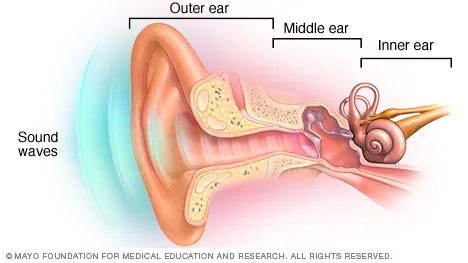博文
助听器可将死亡风险降低近25%
||
助听器可将死亡风险降低近25%
诸平

据世界卫生组织(WHO)网站报道,全世界人口的5%以上,即4.3亿人的听力需要康复治疗,以解决他们的残疾性听力损失(4.32亿成人,3400万儿童)。据估计,到2050年预计将近25亿人有某种程度的听力损失,至少7亿人需要听力康复。也就是说有世界人口十分之一的人发生残疾性听力损失。而且听力损失流行率随着年龄增长而增加。60岁以上人群中,超过25%的人受到残疾性听力损失的影响。超过一半的75岁以上的美国人出现一定程度的年龄相关听力减退。另外,不安全的用耳习惯使超过10亿青年面临永久性听力丧失风险,而这本可避免。中国疾病预防控制中心报道,据调查,我国患中度以上听力障碍的人占总人口的5.17%。《中国听力健康报告(2021)》蓝皮书指出,老年性耳聋占据了我国听力残疾致残原因的首位。第二次全国残疾人抽样调查数据显示,总体上,老年性耳聋占据了我国听力残疾致残原因的首位(51.61%),其次为原因不明(13.61%)、中耳炎(11.80%)、全身性疾病(4.83%)等。男性原因不明、中耳炎、药物中毒等类听力残疾发生率高于女性,全身性疾病导致听力残疾的女性比例高于男性。面对听力损失,还是选择适合自己助听器,它不仅可以改善听力,提高生活质量,还有益于长寿。
美国南加州大学(University Of Southern California简称USC, Los Angeles, CA, USA)2024年1月13日提供的消息表明,助听器可将死亡风险降低近25%,使使用者更长寿(Live Longer: Hearing Aids Reduce the Risk of Death by Almost 25%)。
南加州大学凯克医学(Keck Medicine of USC)的研究表明,听力损失的成年人定期使用助听器与死亡率降低24%相关。这项研究提出了潜在的健康益处,并强调了更好地获得听力保健的必要性。
一项新的研究表明,助听器可以将死亡风险降低近25%。研究显示,听力损失影响了大约4000万美国成年人,但只有十分之一需要助听器的人使用助听器。但是,根据USC凯克医学2024年1月3日发表在《柳叶刀健康长寿》(The Lancet Healthy Longevity)杂志上的一项新研究,那些不使用助听器但应该使用助听器的人可能想把佩戴助听器作为他们的新年决心之一。详见Janet S Choi, Meredith E Adams, Eileen M Crimmins, Frank R Lin, Jennifer A Ailshire. Association between hearing aid use and mortality in adults with hearing loss in the USA: a mortality follow-up study of a cross-sectional cohort. The Lancet Healthy Longevity, 2024, 5(1): e66-e75. DOI: 10.1016/S2666-7568(23)00232-5. Available online 3 January 2024. https://www.sciencedirect.com/science/article/pii/S2666756823002325
参与此项研究的除了来自美国南加州大学的研究人员之外,还有来自美国明尼苏达大学(University of Minnesota, Minneapolis, MN, USA)以及美国约翰霍普金斯大学医学院(Johns Hopkins University School of Medicine, Baltimore, MD, USA)的研究人员。
使用助听器的好处(Benefits of Hearing Aid Use)
该研究的首席研究员、凯克医学的耳鼻喉科医生、公共卫生硕士珍妮特·崔(Janet S Choi, Fig. 2)说:“我们发现,听力损失的成年人经常使用助听器的死亡率比从不佩戴助听器的人低24%。这一结果表明,助听器可以起到保护人体健康和防止过早死亡的作用。”
先前的研究表明,未经治疗的听力损失会导致寿命缩短(以及其他不良后果,如社会孤立、抑郁和痴呆)。然而,到目前为止,很少有研究表明使用助听器是否可以降低死亡风险。珍妮特·崔说,这项研究是迄今为止对美国听力损失、助听器使用和死亡率之间关系的最全面分析。
研究方法及结果(Research Methodology and Findings)
珍妮特·崔和她的同事们利用1999~2012年间美国国家健康与营养检查调查(National Health and Nutrition Examination Survey)编制的数据,确定了近1万名20岁及以上的成年人,他们完成了听力测量评估(一种用于测量听力能力的测试),并填写了有关助听器使用情况的问卷。研究人员对他们的死亡率进行了平均10年的跟踪调查。
共有1863名成年人被确定患有听力损失。其中237人是经常使用助听器的人,他们每周至少戴一次助听器,每周戴5个小时,或者一半的时间,还有1483人被确定为从不使用助听器。报告每月佩戴设备少于一次或频率较低的受试者被归类为非定期用户(non-regular users)。
研究人员发现,无论听力损失程度(从轻度到重度)等变量如何,经常使用助听器的人和从不使用助听器的人之间的死亡风险差异几乎保持在25%。年龄、种族、收入、教育和其他人口统计数据;还有病史。不经常使用助听器的人和从不使用助听器的人之间的死亡风险没有差异,这表明偶尔使用助听器可能不会提供任何延长寿命的好处。
虽然这项研究没有研究为什么助听器可以帮助那些需要助听器的人活得更长,但珍妮特·崔指出,最近的研究将助听器的使用与降低抑郁和痴呆水平联系起来。她推测,听力改善带来的心理健康和认知能力的改善可以促进整体健康,这可能会延长寿命。
潜在的原因和未来的方向(Potential Reasons and Future Directions)
珍妮特·崔希望这项研究能鼓励更多的人佩戴助听器,尽管她承认,包括成本、耻辱和难以找到适合和功能良好的设备在内的因素是使用助听器的障碍。
珍妮特·崔能够亲身体会到这些挑战。她出生时左耳听力受损,但直到30多岁才戴上助听器。然后,她花了几年时间才找到对她有效的方法。她目前正在开发一个人工智能驱动的数据库,对助听器的选择进行分类,并根据患者的个人需求进行定制。
她还主张进行更大规模的研究,以进一步了解定期使用助听器与降低死亡风险之间的联系,并促进听力保健。
上述介绍,仅供参考。欲了解更多信息,敬请注意浏览原文或者相关报道。
Background
Hearing loss has been identified as an independent risk factor for negative health outcomes and mortality. However, whether rehabilitation with hearing aid use is associated with lower mortality is currently unknown. This study aimed to examine the associations of hearing loss, hearing aid use, and mortality in the USA.
Methods
In this cross-sectional, follow-up study, we assessed 9885 adults (age 20 years and older) who participated in the National Health and Nutrition Examination Survey between 1999 and 2012 and completed audiometry and hearing aid use questionnaires (1863 adults with hearing loss). Main measures included hearing loss (speech-frequency pure-tone average) and hearing aid use (never users, non-regular users, and regular users). Mortality status of the cohort was linked to the National Death Index up to Dec 31, 2019. Cox proportional regression models were used to examine the association between hearing loss, hearing aid use, and mortality while adjusting for demographics and medical history.
Findings
The cohort consisted of 9885 participants, of which 5037 (51.0%) were female and 4848 (49.0%) were male with a mean age of 48.6 years (SD 18.1) at baseline. The weighted prevalence of audiometry-measured hearing loss was 14.7% (95% CI 13.3–16.3%) and the all-cause mortality rate was 13.2% (12.1–14.4) at a median 10.4 years of follow-up (range 0.1–20.8). The rate of regular hearing aid use among adults with hearing loss was 12.7% (95% CI 10.6–15.1). Hearing loss was an independent risk factor associated with higher mortality (adjusted hazard ratio [HR] 1.40 [95% CI 1.21–1.62]). Among individuals with hearing loss, the adjusted mortality risk was lower among regular hearing aid users in comparison with never users (adjusted HR 0.76 [0.60–0.95]) accounting for demographics, hearing levels, and medical history. There was no difference in adjusted mortality between non-regular hearing aid users and never users (adjusted HR 0.93 [0.70–1.24]).
Interpretation
Regular hearing aid use was associated with lower risks of mortality than in never users in US adults with hearing loss when accounting for age, hearing loss, and other potential confounders. Future research is needed to investigate the potential protective role of hearing aid use against mortality for adults with hearing loss.
https://wap.sciencenet.cn/blog-212210-1417906.html
上一篇:分解木质素中的碳-碳键,制造可持续的航空燃料
下一篇:[转载]我是这样证明√2不是有理数的

